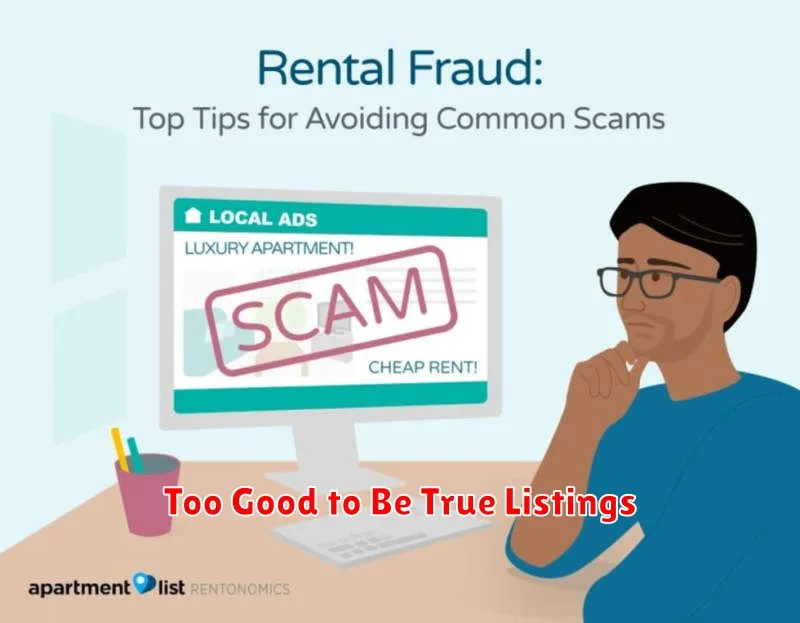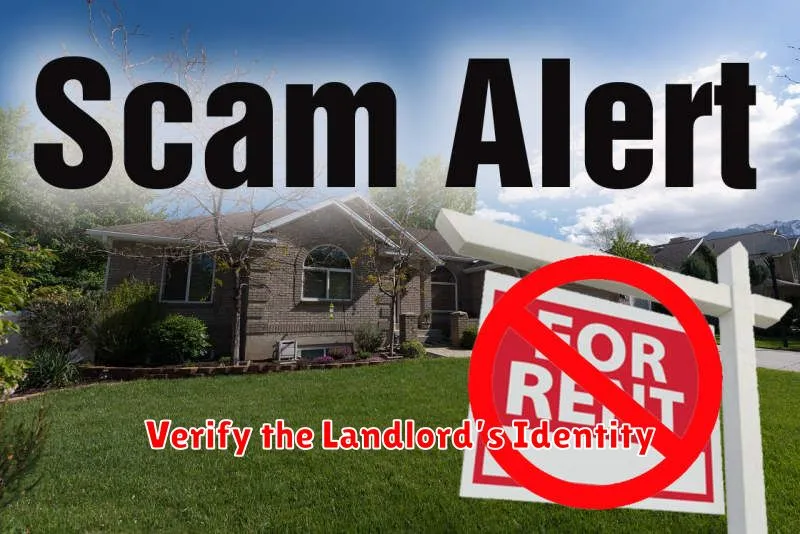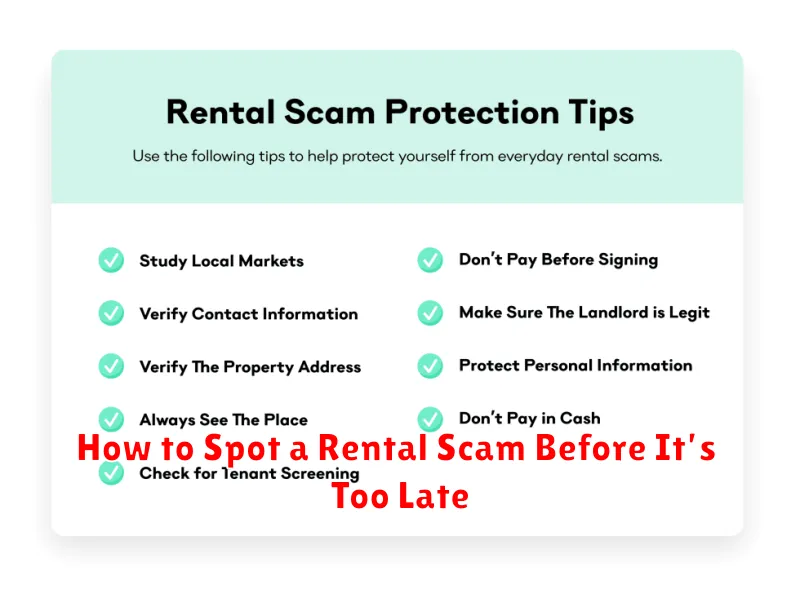Finding the perfect rental property can be an exciting but also challenging process. Unfortunately, amidst the genuine listings, rental scams lurk, ready to prey on unsuspecting individuals. Learning how to spot a rental scam is crucial to protecting yourself from financial loss and emotional distress. This guide will provide you with the essential knowledge and tools to identify red flags and avoid becoming a victim of a rental scam. We’ll cover common rental scam tactics, provide practical tips for verifying listings, and empower you to make informed decisions during your rental search. Don’t let rental scammers ruin your dreams of finding the ideal place to call home. Learn how to spot a rental scam before it’s too late.
Rental scams come in various forms, from listings for properties that don’t exist to requests for upfront payments before you’ve even seen the property. Understanding the signs of a rental scam can save you time, money, and significant stress. We’ll explore common red flags such as unusually low rent, requests for wire transfers, high-pressure tactics, and inconsistencies in the listing details. By becoming familiar with these rental scam indicators, you can confidently navigate the rental market and avoid falling victim to fraudulent activities. Take the first step towards securing safe and legitimate housing by learning how to spot a rental scam effectively.
Common Signs of a Rental Scam
Too good to be true deals are a major red flag. If the rent is significantly lower than comparable properties in the area, be wary. Scammers often lure victims with unbelievably low prices. Also, be suspicious of listings with vague descriptions or low-quality photos. Legitimate landlords typically provide detailed information and clear images.
Requests for upfront payment before seeing the property is another common tactic. Scammers may pressure you to pay a security deposit or first month’s rent without ever having met you or shown you the unit. Avoid wire transfers or other untraceable payment methods. Insist on a formal lease agreement and thoroughly review it before signing or making any payments.
High-pressure tactics are a warning sign. If the landlord pressures you to make a quick decision or claims there are multiple other applicants, proceed with caution. Verify the landlord’s identity and ownership of the property through public records if possible. If anything feels off, trust your instincts and walk away.
Too Good to Be True Listings

When searching for a new apartment or home, be wary of listings that appear too good to be true. Often, these listings advertise unrealistically low prices for desirable properties. These scams aim to attract potential renters or buyers quickly. Key indicators of a fraudulent listing include significantly lower rent or sale prices compared to similar properties in the area, requests for upfront payment before a viewing, and poor quality photos or descriptions. Be diligent in your research and prioritize listings from reputable sources.
Protect yourself by verifying the legitimacy of the listing. Confirm the landlord or agent’s identity and contact information. Avoid wire transfers or sending money before seeing the property in person. If possible, schedule a showing and thoroughly inspect the unit. If something feels off, trust your instincts. A legitimate landlord or agent will be happy to answer your questions and provide necessary documentation.
If you encounter a suspicious listing, report it to the platform where you found it. This helps protect other potential victims from falling prey to the same scam. Remember, a healthy dose of skepticism can go a long way in avoiding rental and real estate fraud. Thorough research and a cautious approach are your best defenses against too-good-to-be-true listings.
Never Send Money Without a Tour

Never send money to a landlord or property manager before physically touring a property. A legitimate rental opportunity will always allow you to inspect the unit before signing a lease or making any payment. Sending money sight unseen leaves you extremely vulnerable to scams. Scammers frequently use photos and descriptions of properties they don’t own or manage to steal money from unsuspecting renters.
If you’re unable to tour in person due to distance or other circumstances, insist on a live virtual tour. Request a real-time video walkthrough using a platform like FaceTime or WhatsApp. This allows you to ask questions and confirm the property exists and matches the advertised description. Be wary of pre-recorded videos as these can be easily manipulated. Even with a virtual tour, proceed with extreme caution and thoroughly research the landlord or property manager.
Protecting yourself from rental scams is paramount. Here are some key things to remember: Research the market value of similar properties to ensure the rent is reasonable. Independently verify the landlord’s ownership through public records. Never pay with untraceable methods like wire transfers or gift cards. If a deal seems too good to be true, it probably is.
Verify the Landlord’s Identity

Before signing a lease or providing any personal information, verify the landlord’s identity. This crucial step protects you from rental scams and ensures you’re dealing with the legitimate property owner. Requesting to see a government-issued photo ID, such as a driver’s license or passport, is a standard practice. Cross-reference the name on the ID with the name on the property deed, if possible. For corporate landlords, research the company’s registration and confirm the individual’s authority to represent them.
If the landlord claims to be managing the property on behalf of the owner, request documentation authorizing them to do so. This could include a property management agreement or power of attorney. Don’t hesitate to contact the owner directly to confirm the management arrangement. For added security, consider conducting an independent online search of the landlord or property management company to check for reviews, complaints, or any red flags.
Taking these precautionary steps can help prevent you from falling victim to rental fraud. If anything seems suspicious or inconsistent, trust your instincts and consider walking away. Remember, a legitimate landlord will understand and respect your need to verify their identity and will be happy to provide the necessary documentation.
How to Report a Rental Scam
If you believe you’ve encountered a rental scam, it’s crucial to report it immediately. This protects you and helps prevent others from becoming victims. Gather all relevant information, including the scammer’s contact details (email, phone number, website), copies of any communication, and details about the fraudulent listing (address, price, description). Report the scam to the platform where you encountered it (e.g., Craigslist, Facebook Marketplace, Zillow). These platforms often have dedicated reporting mechanisms for fraudulent activity. You should also file a complaint with the Federal Trade Commission (FTC) at ReportFraud.ftc.gov and the Internet Crime Complaint Center (IC3) at ic3.gov.
Documenting the scam thoroughly is essential. Take screenshots of the listing, emails, text messages, and any other relevant online interactions. If you’ve lost money, keep records of any payments made, including wire transfer receipts, bank statements, and money order information. This documentation will be valuable when filing reports and potentially pursuing legal action. Consider contacting your local law enforcement agency to report the incident, particularly if you’ve experienced a financial loss or believe you are in immediate danger.
Protecting yourself from future scams is paramount. Be wary of listings that seem too good to be true, particularly those with significantly below-market rents. Verify the property’s existence through independent sources, such as public records or by physically visiting the location. Never wire money or make payments through untraceable methods. Be cautious of high-pressure tactics or requests for personal information beyond what’s necessary for a legitimate rental application. Conduct thorough research on the landlord or property manager and be skeptical of individuals who refuse to meet in person or show the property.
What to Do If You’ve Been Scammed
Discovering you’ve been scammed is upsetting, but taking swift action is crucial. First, document everything. This includes communication records (emails, texts, letters), transaction details, and any other relevant information. Then, report the scam to the appropriate authorities. This might involve contacting your local police department, the Federal Trade Commission (FTC), or the Internet Crime Complaint Center (IC3), depending on the nature of the scam. If the scam involved a financial institution, immediately contact your bank or credit card company to report the fraudulent activity and take steps to protect your accounts.
Next, take steps to mitigate the damage. This may involve changing your passwords, monitoring your credit reports, or placing a fraud alert on your credit file. If you shared personal information, consider taking steps to protect your identity from further misuse. It is also helpful to warn others about the scam. Sharing your experience can help prevent others from becoming victims.
Finally, remember that it’s okay to seek support. Being scammed can be emotionally distressing. Reach out to trusted friends, family members, or a counselor to discuss your experience and get the emotional support you need. Don’t blame yourself for falling victim to a scam – scammers are skilled manipulators. Focus on taking the necessary steps to protect yourself and move forward.
Stay Safe with Secure Platforms
Choosing a secure platform is crucial for protecting your data and privacy. Look for platforms that employ strong encryption, multi-factor authentication, and regularly update their security protocols. These measures help safeguard your information from unauthorized access and potential breaches. Additionally, consider platforms that have a transparent privacy policy and a proven track record of security.
Be cautious about sharing sensitive information online. Avoid using public Wi-Fi for transactions or accessing confidential accounts. Strong passwords are essential, and using a unique password for each platform is highly recommended. Enable automatic software updates to patch security vulnerabilities. Regularly review the permissions granted to apps and websites, revoking access to those you no longer use or trust.
If you suspect a security breach, take immediate action. Change your passwords, contact the platform’s support team, and monitor your accounts for any unauthorized activity. Staying informed about common online threats and practicing safe browsing habits can significantly reduce your risk of becoming a victim of cybercrime.

